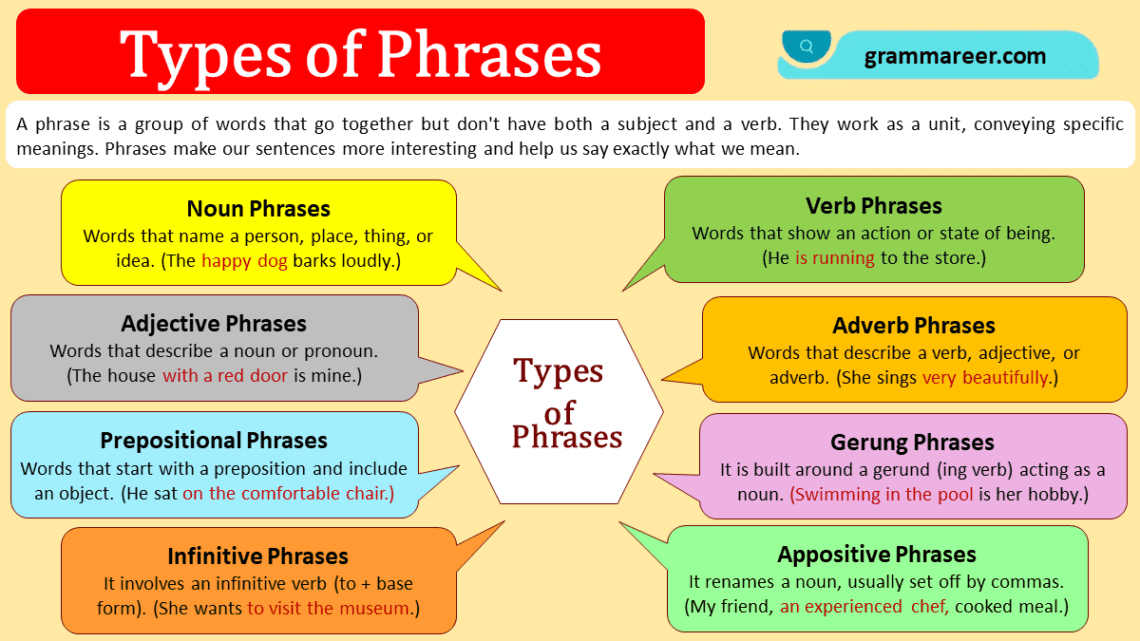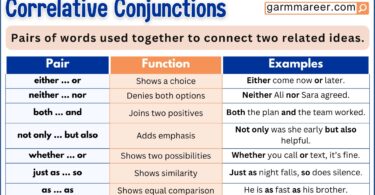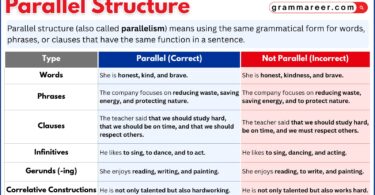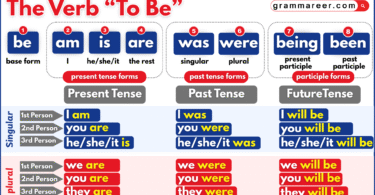Understanding Types of Phrases is like learning different tools for speaking and writing in English. Imagine them as special groups of words with specific jobs, such as describing things or telling us more about actions. These include noun phrases and adverbial phrases, each having its unique purpose. As we explore absolute phrases and simpler ones like prepositional phrases, we get better at building sentences. Let’s take a closer look at these phrase varieties to make our English more interesting and clear.
Table of Contents
What Are Phrases?
In simple terms, a phrase is a group of words that go together but don’t have both a subject and a verb. They work as a unit, conveying specific meanings. Phrases make our sentences more interesting and help us say exactly what we mean.
Types of Phrases:
1. Noun Phrases:
In English, a noun phrase is a group of words that work together to talk about a person, place, thing, or idea – like “cat” or “school.” For example, instead of just saying “an apple,” we can say “The red apple.” Now, “The red apple.” is a noun phrase!
Examples:
- The cat.
- My best friend.
- A shiny car.
- The big tree.
- An interesting book.
2. Verb Phrases:
A verb phrase is a group of words working together to show an action or state. It always includes a main verb and might have one or more helping verbs.
Examples:
- She runs fast.
- They are playing.
- I will dance.
- He has studied.
- We can swim.
3. Adjective Phrases:
An adjective phrase is a group of words that gives more information about a noun (a person, place, or thing). It makes our sentences more interesting by adding details.
Examples:
- The boy in the red shirt is my friend.
- She loves dresses with colorful patterns.
- We visited a park near the tall trees.
- I have a friend with a big smile.
- He owns a car of sleek design.
4. Adverb Phrases:
Adding details to verbs, adjectives, or other adverbs, these phrases answer how, when, where, or to what extent.
Examples:
- How: She danced with joy.
- When: They play soccer after school.
- Where: The cat sat on the windowsill.
- To What Extent: He works very hard.
- Why: He smiled because he was happy.
5. Prepositional Phrases:
Starting with a preposition, these phrases include an object and provide information about time, location, or direction.
Example:
- The cat is under the bed.
- I walked to the store.
- She sat on the chair.
- The book is in the bag.
- We played at the park.
6. Gerund Phrases:
A gerund phrase starts with a verb ending in -ing. It works as a noun, and it usually involves doing something.
Example:
- Running fast is good exercise.
- Eating pizza makes me happy.
- Swimming in the pool is refreshing.
- Laughing with friends is fun.
- Reading books is relaxing.
7. Infinitive Phrases:
An infinitive phrase is a group of words that begins with the word “to” followed by a verb.
Example:
- I am hungry, so I want to eat lunch.
- The sun is shining; let’s plan to go outside.
- I love stories; I’m excited to read a book.
- It’s playtime; do you want to play games?
- Every day is a chance to learn new things.
8. Appositive Phrases:
An appositive phrase renames and explains a noun. It gives more information about a person, place, or thing in a sentence. Usually set off by commas.
Example:
- My friend, the artist, painted a beautiful picture.
- The cat, a fluffy ball of fur, napped on the sofa.
- My sister, an excellent cook, prepared dinner.
- My favorite fruit, ripe mangoes, is in season.
- The flower, a delicate rose, bloomed in the garden.
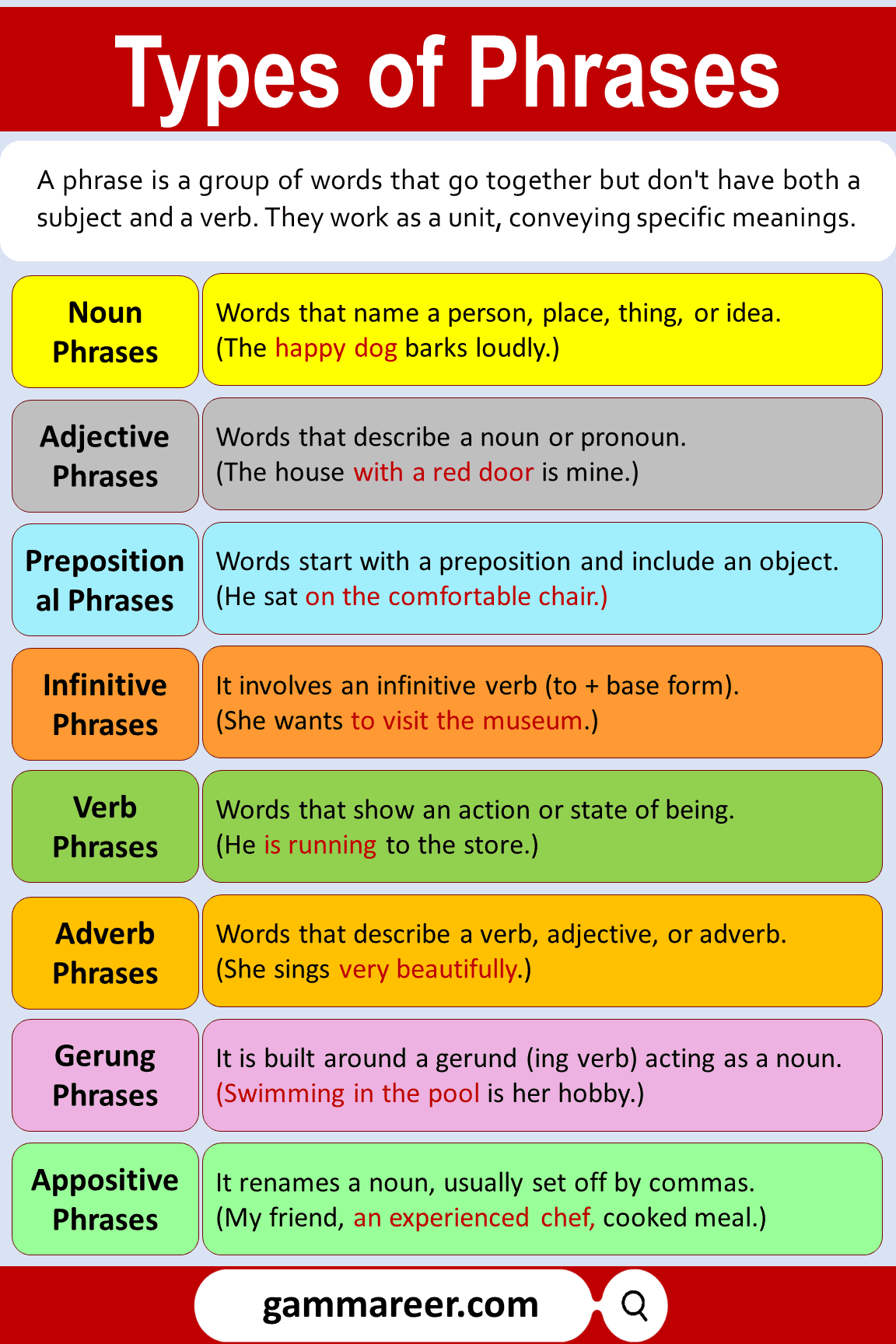
Examples on Types of Phrases
- My friend is coming over.
- We will play after lunch.
- The book is very interesting.
- She reads quite slowly.
- The keys are on the table.
- I enjoy reading books.
- She wants to eat pizza.
- My brother, a skilled artist, painted a mural.
- She likes to go shopping.
- It’s his dream to become a pilot.
- He is good at fixing things.
- She is ready to face any challenge.
- He solves problems by thinking creatively.
- My goal, to learn French, keeps me motivated.
MCQs on Types of Phrases:
Q1. What type of phrase does not have a full sentence’s subject and verb?
- a) Noun Phrase
- b) Verb Phrase
- c) Adjective Phrase
- d) Prepositional Phrase
Q2. Which phrase provides more information about a noun or pronoun?
- a) Adjective Phrase
- b) Adverb Phrase
- c) Prepositional Phrase
- d) Absolute Phrase
Q3. What does a Gerund Phrase center on?
- a) Noun
- b) Verb
- c) Adjective
- d) Adverb
Q4. Which phrase typically starts with a preposition?
- a) Noun Phrase
- b) Verb Phrase
- c) Prepositional Phrase
- d) Participial Phrase
Q5. What type of phrase renames or explains a noun and is usually set off by commas?
- a) Adjective Phrase
- b) Appositive Phrase
- c) Gerund Phrase
- d) Infinitive Phrase
Q6. What kind of phrase includes an infinitive verb and can function as a noun, adjective, or adverb?
- a) Noun Phrase
- b) Verb Phrase
- c) Infinitive Phrase
- d) Appositive Phrase
Q7. Which phrase provides additional details to a verb, adjective, or other adverb?
- a) Adjective Phrase
- b) Adverb Phrase
- c) Appositive Phrase
- d) Absolute Phrase
Q8. What type of phrase typically has a main verb along with auxiliary (helping) verbs?
- a) Noun Phrase
- b) Verb Phrase
- c) Adverb Phrase
- d) Gerund Phrase
Q9. Which phrase acts as a noun and is centered around a gerund (an -ing verb form)?
- a) Gerund Phrase
- b) Adjective Phrase
- c) Noun Phrase
- d) Absolute Phrase
Q10. What kind of phrase usually includes a subject and a verb?
- a) Noun Phrase
- b) Verb Phrase
- c) Adjective Phrase
- d) Prepositional Phrase
Q11. Which phrase is often set off by commas and adds extra information to a sentence?
- a) Adjective Phrase
- b) Infinitive Phrase
- c) Absolute Phrase
- d) Prepositional Phrase
Q12. What does an adverb phrase add details to?
- a) Noun
- b) Verb
- c) Adjective
- d) All of the above
Q13. What type of phrase often functions as the subject, object, or complement in a sentence?
- a) Noun Phrase
- b) Adjective Phrase
- c) Adverb Phrase
- d) Gerund Phrase
Q14. What is the function of an Absolute Phrase in a sentence?
- a) Modify a noun
- b) Add details to a verb
- c) Provide extra information
- d) None of the above
Q15. What type of phrase begins with a preposition and includes an object?
- a) Noun Phrase
- b) Verb Phrase
- c) Adjective Phrase
- d) Prepositional Phrase
Q16. What does a participial phrase often start with?
- a) A preposition
- b) An infinitive verb
- c) A gerund
- d) A participle
Answers:
- a
- a
- a
- c
- b
- c
- b
- b
- a
- b
- a
- d
- a
- c
- d
- d
FAQs
Q1. What is a phrase in English grammar?
A phrase is a group of words working together as a unit, lacking a complete sentence’s subject and verb.
Q2. How do phrases differ from sentences?
Phrases are smaller word groups without a full subject and verb, while sentences are complete thoughts with both.
Q3. What role do phrases play in sentences?
Phrases add detail, description, and information to sentences, making language more expressive.
Q4. Are there different types of phrases?
Yes, there are various types, including noun phrases, verb phrases, adjective phrases, adverb phrases, and more.
Q5. What is a noun phrase, and how does it function?
A noun phrase acts as a noun, serving as the subject, object, or complement in a sentence.
Q6. Can you provide an example of a verb phrase?
Certainly! “She is reading a fascinating novel.” Here, “is reading” is a verb phrase.
Q7. How do adverb phrases enhance sentences?
Adverb phrases provide additional details about verbs, adjectives, or other adverbs, answering questions like how, when, where, or to what extent.
Q8. What is the function of a prepositional phrase?
Prepositional phrases begin with a preposition and provide information about time, location, or direction.
Q9. How does an absolute phrase contribute to a sentence?
An absolute phrase adds extra information, often set off by commas, to a sentence.
Q10. Can you distinguish between gerund and infinitive phrases?
Certainly! A gerund phrase centers around an -ing verb form and acts as a noun, while an infinitive phrase starts with “to” and can function as a noun, adjective, or adverb.
You May Also Like

